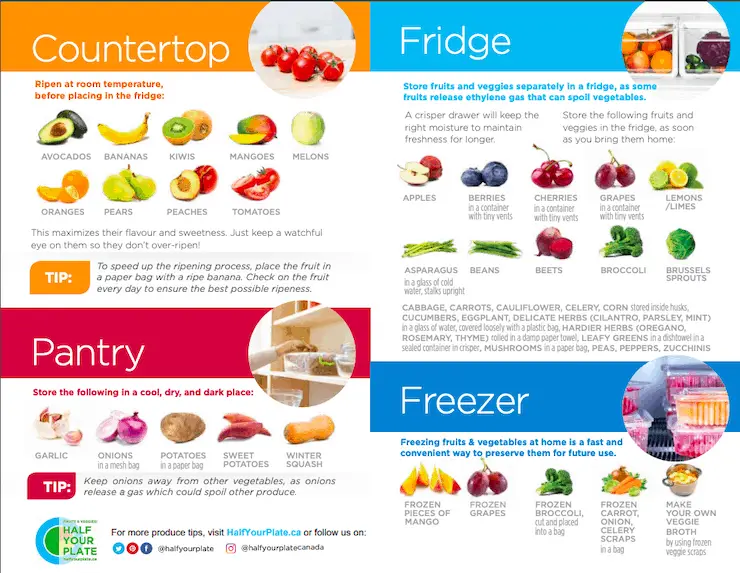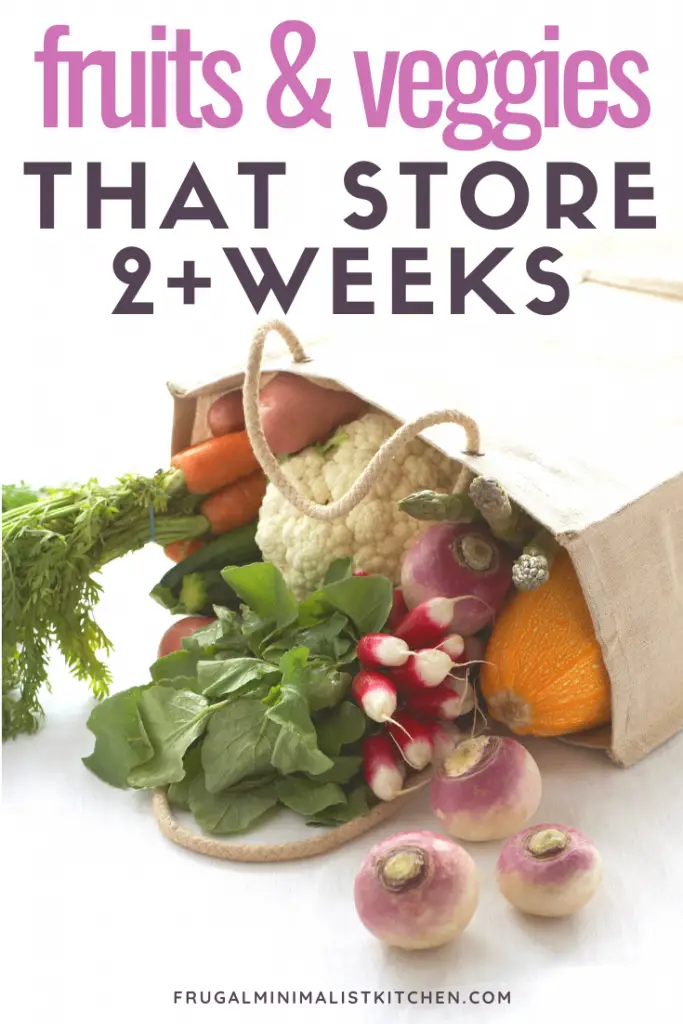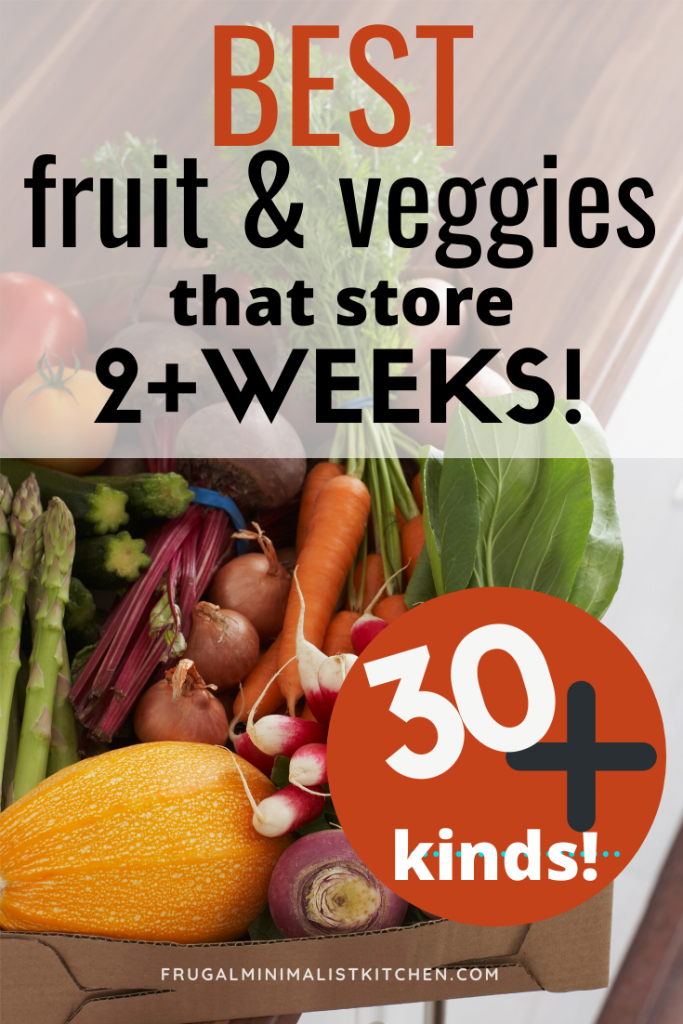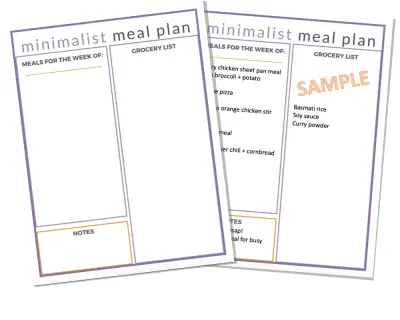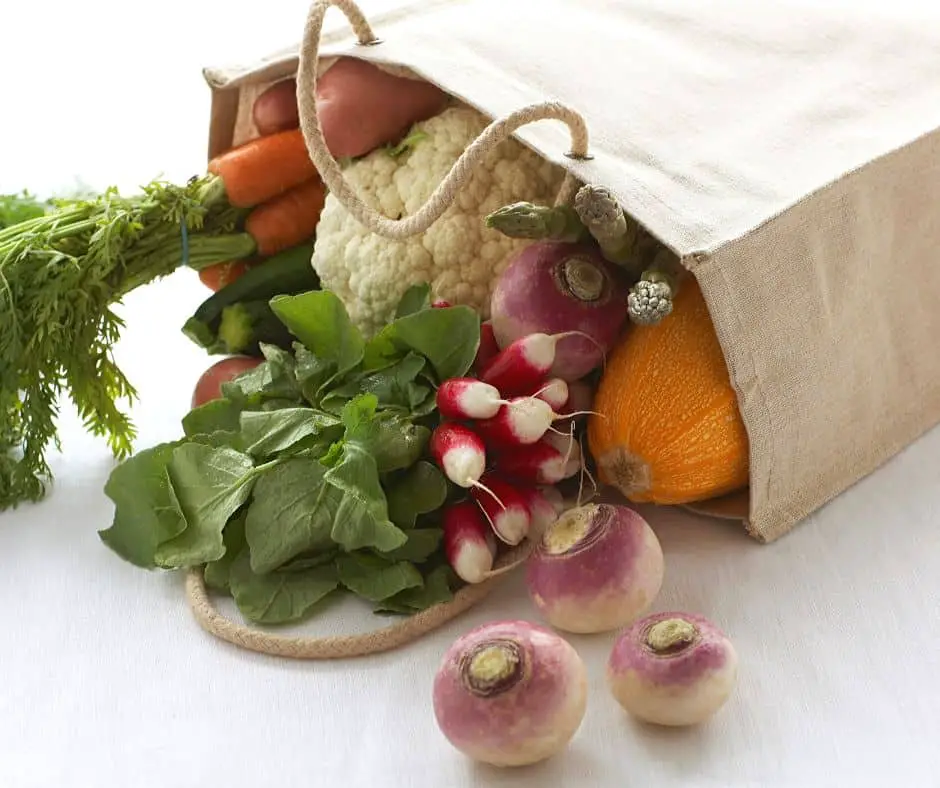
Sometimes we need to go as long as possible between grocery shopping trips. Often we run out of fresh fruits and vegetables first which makes us have to make another trip to the store.
I want to help you go as long as possible between grocery store visits without sacrificing variety and nutrition of your food or not getting enough vegetables and fruits.
It may seem impossible to go 2 weeks or longer without stocking up on fresh produce, but it’s totally possible! Just choose fruits & veggies that store for 2 weeks or longer!
Remember, not so long ago most people grew gardens and preserved all of their own produce for the winter. It’s great if you have a garden and know how to preserve food, but you can do this even buying from the grocery store.
The best kinds of produce to buy are hearty vegetables and fruit that will last weeks or even months.
It’s also great to buy frozen veggies and fruit. They have the same nutrition, and sometimes even more, than fresh!
Canned fruit and veg are a good choice too.
The whole point of this is to help you eat enough vegetables and fruit between grocery shopping trips and avoid the hassle of running to the store to pick up a few things every few days.
Here are my best tips to help you choose fruits and veggies that will store well for weeks or even months:
Buy long lasting vegetables and fruits
As I mentioned earlier, past generations grew their own produce and stored long lasting vegetables and fruit over the winter.
There are quite a few foods that will last months in proper storage conditions without refrigeration such as:
Potatoes
Carrots
Winter Squashes
Turnips/Rutabagas
Beets
Sweet potatoes
Onions
Garlic
Apples
Cabbage
These are some of the longest lasting fruits & veggies, but you don’t have to be limited to just them!
There are lots of other long lasting produce that will last at least 2 weeks in the fridge or with proper storage conditions!
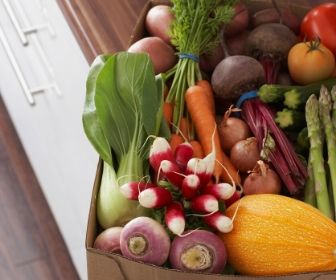
List of longest lasting fruits & veggies that will store for 2 weeks or more:
Apples
Cabbage
Oranges
Lemons
Limes
Grapefruit
Garlic
Onions
Pomegranate
Potatoes
Sweet Potatoes
Carrots
Butternut Squash
Kabocha/Japanese Squash
Spaghetti Squash
Acorn Squash
Pumpkin
Beets
Celeriac
Radishes
Daikon Radish
Rutabaga
Cauliflower
Broccoli
Eggplant
Brussels Sprouts
Kale
Whole lettuce with roots attached
Turnips
Celery
Parsnips
Kiwis
These foods will store a long time so you don’t need to go to the grocery store every week.
To add even more variety to your fruit & veggie intake in between grocery trips, make sure to have some frozen and canned fruit and veg on hand too!
I also recommend growing your own herbs and greens in a sunny windowsill, storing food properly, and preserving some food. Not only will these help you have access to produce for longer between grocery trips, but you’ll also have fun!
Keep reading for more tips about keeping fruits and veggies that store at least 2 weeks:
Storing food properly
The estimated shelf life of food is for ideal circumstances. Try to store your produce in as optimal of conditions as possible to reduce the chance it’ll go bad before you get to eating it.
Here is a great resource about how to store fruits & vegetables properly and also check out how to store green onions properly, and this article about how to tell when cauliflower is bad.
Buy frozen produce
Frozen veggies and fruit are excellent choices! They’re nutritious, affordable and they’re already prepared (saving you time preparing meals!)
Lots of people are concerned that the nutritional value of frozen produce is reduced. This is actually a huge myth! Lots of studies have shown that frozen vegetables can actually be more nutritious than fresh in many cases!
This is because frozen produce is picked when ripe and flash frozen shortly after, whereas fresh produce is often picked slightly underripe and transported for days or weeks before even getting to the grocery store!
The freezing process locks in the peak nutrition!
In a lot of cases, frozen produce is also less expensive than fresh. This is especially true for out of season produce. The food producers get the fruit when it’s fresh and in season, then freeze it to sell all year long.
Frozen vegetables and fruits last severals months. Even if it goes a bit past it’s prime and starts showing some signs of freezer burn, it’s still perfectly safe to eat. It just might not be quite as tasty.
Practicing good stock rotation by making sure you eat the older stuff before the newer stuff will reduce the chances of food getting freezer burnt.
Another huge benefit of frozen produce is that it’s already completed prepped. It’s washed, chopped and ready to use!
There is no food waste in terms of peelings or whatever so the price you pay is all for edible food.
Of course there is also the waste of the plastic bag it comes in, but if you’re concerned about that, try looking for types of plastic that can be reused or recycled and buy those if you have the option to.
Buy canned produce
Canned veggies have a bad reputation for being mushy, washed out, and less nutritious.
While arguably they aren’t as tasty as fresh or frozen, there are still some good options!
The nutrition of canned vegetables is still pretty similar to fresh or frozen produce.
Since most canned veggies are heat treated to help preserve them, their nutrition is similar to boiled veggies. When you boil veggies, some of the nutrition is lost due to heat and also is leached into the water.
So yes, slightly less nutrition than fresh or frozen, but still much better than nothing at all!
Plus canned veggies are all many people have access to, so it’s actually quite harmful to warn people not to eat them. You’re always better to eat the veggies that are available to you than nothing at all.
My favorite canned veggies and fruit:
Canned tomatoes
Tomato sauce
Tomato paste
Canned pumpkin
Canned corn
Canned baby corn
Canned artichoke hearts
Canned olives
Pickles
Pickled asparagus
Pickled beans
Pickled beets
Pickled carrots
Canned peaches
Canned pears
Canned applesauce
Canned mandarin oranges
Canned pineapple
Canned fruit cocktail
Tips for healthier canned fruit & veggie choices:
Choose veggies with no added salt
Choose fruits packed in water or fruit juice rather than syrup.
Some brands have options with artificial sweeteners. If you eat artificial sweeteners, you can choose ones that have them as well.
Choosing fruit packed in water, fruit juice, or with artificial sweeteners will reduce the amount of total and added sugars.
If you’re concerned about BPA, a material often used to line canned foods, choose foods canned in glass jars instead.
Buy dried fruit & vegetables
Dried fruits and veggies are often overlooked, even though they can be valuable sources of nutrients. Their shelf life is extra long if stored properly and they make a great portable snack!
Try to choose dried fruits without added sugar when possible.
My favorite dried vegetables & fruit:
Sun-dried tomatoes
Dried mushrooms
Dried onions
Garlic powder
Seaweed (like nori wraps used for sushi!)
Raisins
Craisins
Dried Apricots
Banana chips
Apple chips
Prunes
Dried mango slices
Currants
Dates
Dried Figs
Grow your own food
Growing your own food is a great way to have food last longer. While growing a full out garden is a great option if it’s available to you, even if you live in a small apartment with a sunny window you can grow some of your own food.
Excellent ideas:
Regrow green onions from the ends of store bought ones
Regrow celery from the end
Regrow romaine lettuce
Grow micro greens
Start sprouts
Grow potted herbs
Here are some products that will help you grow your own veggies indoors and the best ways to store green onions (it can make a difference of keeping them for a few days up to a few months!)
Plan how you eat
If you’re going a couple weeks without getting groceries, you want to make sure you still have an interesting and varied diet by the end of it. Ideally you’re not just going to be left with canned tomatoes and pickles every time!
In order to do this, choose to eat the most perishable foods within the first week or so (depending on how long they last). You’ll likely also have some meals with frozen and canned veg the first week too. In the second week, aim to eat a mix of sturdier fresh produce, frozen, and canned.
You can see how this works well, right? If you were to eat all your long life foods the first week, the second week your fresh stuff would be less desirable or even rotten. If you ate only fresh stuff the first week, your variety for the second week would be a lot more limited.
If you like meal planing, then plan this into your meal plan!
If you are like me and don’t like meal planning, just use it as a guideline to try to use up the more perishable food before it goes bad.
As a rough estimate, we eat about two thirds shorter shelf life produce the first week or so (think tender leafy greens). About 1/3 of our produce would be from more shelf stable produce.
The second week or so, we eat more long lasting fruit and veggies and whatever shorter life stuff is left. We try to prioritize what to eat based on what needs to be used up first, but without solely eating those foods, if that makes sense.
It’s not an exact science so I can’t write down exactly what we do. It varies from week to week and we still make mistakes sometimes!
Preserve your own food
Preserving food can be as simple as freezing leftovers for another meal, or as labor intensive as canning all your own tomatoes!
The method of food preservation you choose should be based on what space and equipment you have available to you, as well as your interests and your taste in food.
For example, if you have a cold cellar, I’d definitely recommend using it to it’s full advantage! If you don’t have a ton of freezer space, then freezing your own food might not be the highest on your priority list.
Whatever you choose, know that even a little bit of food preservation helps.
Easy ways to preserve food:
Refrigerating
Lots of foods last longer in the fridge (or cold storage). For example, root veggies might last a week or two at room temp, but several weeks to several months properly stored in the fridge or cold storage!
Freezing
Freezing is perfect for any veggies or fruits that are on the verge of going bad but you can’t eat them in time. We freeze fruit all the time and use it in smoothies, or in oatmeal or yogurt.
Fermenting
I love experimenting in the kitchen so I’m really into fermenting right now.
There are a lot of super easy recipes out there! For example, you can make delicious sauerkraut in just a few minutes with only 2 ingredients (cabbage and salt). Wait a few weeks and you have sauerkraut that will last several months!
You can do quick pickling recipes in small batches that don’t require canning. You just make it and keep it in the fridge or freezer as you eat it.
Canning
If you have a large garden, canning is almost a must-do activity to ensure you have yummy produce available year round.
It is a lot more labor intensive and also requires specialized equipment so isn’t for everyone. But there are some small batch canning tutorials available that might be useful.
Pickling
Pickling is often a form of canning, but not always. Basically, most people can their pickled vegetables because canning makes it last even longer.
But there are lots of pickling recipes that don’t require canning. Instead, the batch is kept in the fridge.
My MIL has a yummy pickled green bean salad that keeps in the fridge for several months. It’s perfect for preserving the yummy crunch of fresh green beans from the garden and much less time consuming than freezing them.
Plus, she keeps a big jar in her fridge so she has access to a tasty bean salad that’s ready to eat, saving her time on meal prep!
Dehydrating
If you have a garden, dehydrating is another method that I’d highly recommend you consider to preserve food. My mom has a dehydrator and makes delicious “sun dried” tomatoes to add to pasta year long. Dehydrated food like this will probably last for a year or more!
I don’t have a dehydrator but I have made fruit leather in the oven before!
We went berry picking. We froze some berries, but didn’t want to entirely fill our freezer with berries, so tried making some fruit leather in the oven and it was a success! Yum!
With all these tips, I’m confident you will be able to reduce your shopping trips to be less frequent. You’ll be able to avoid grocery shopping for at least 2 weeks!
Tell me, which tip about fruits and veggies that store did you find the most helpful?
Read: What to do with leftover cranberry sauce?

